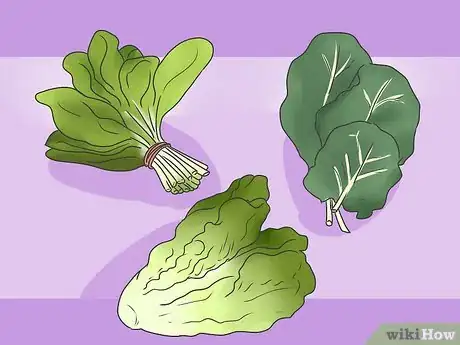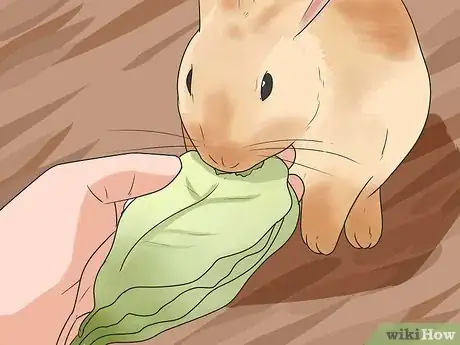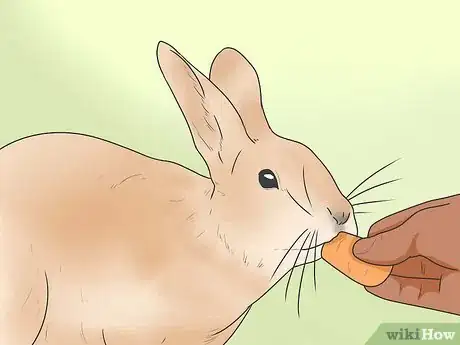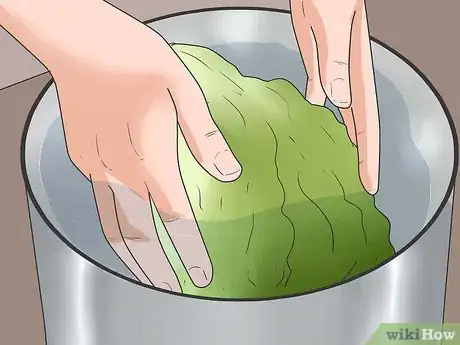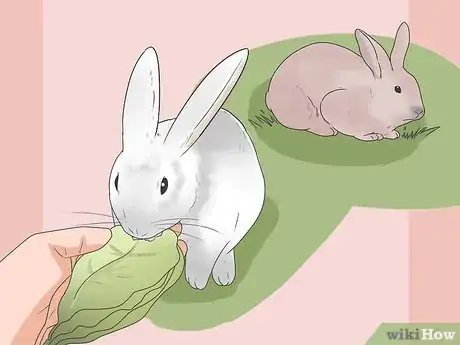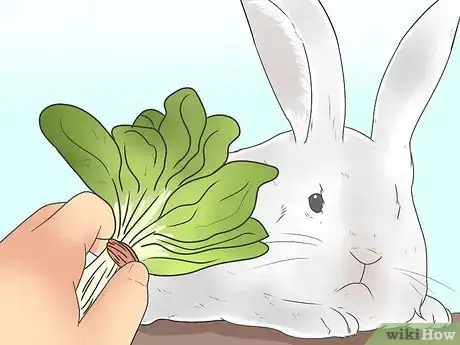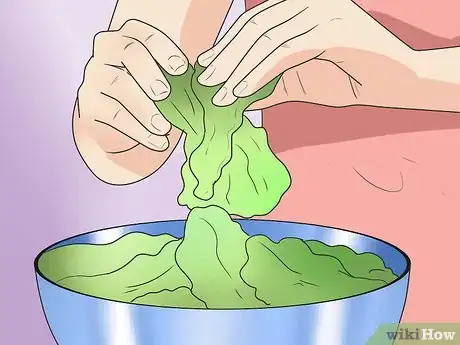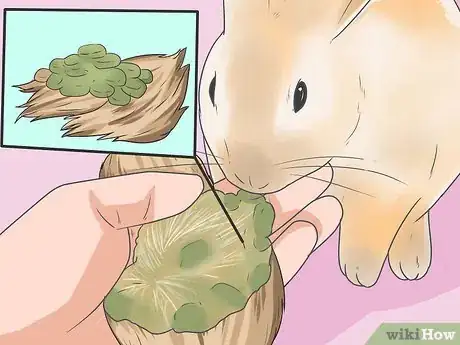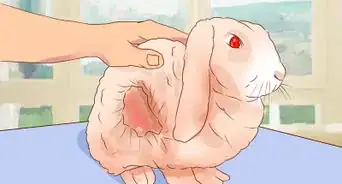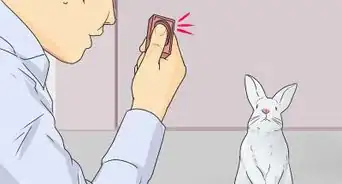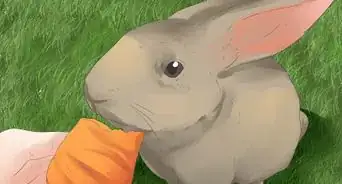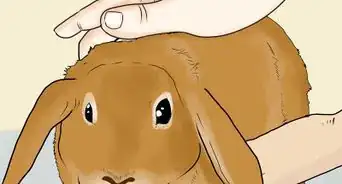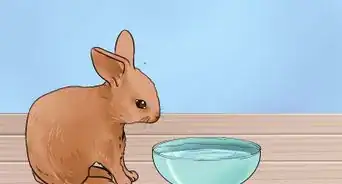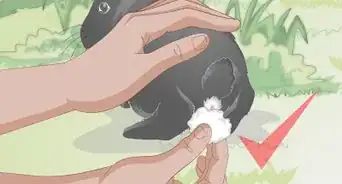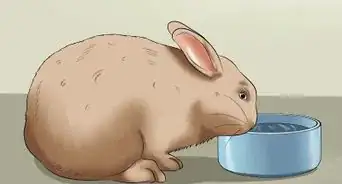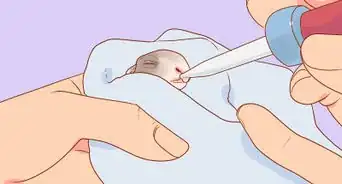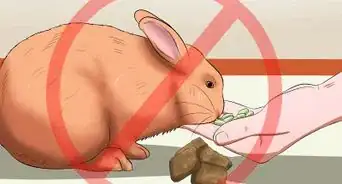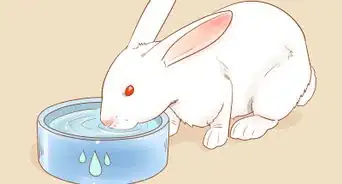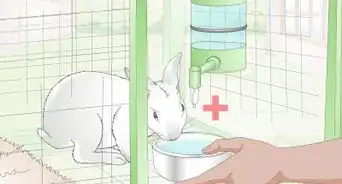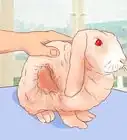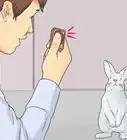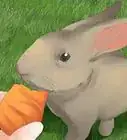This article was co-authored by Pippa Elliott, MRCVS. Dr. Elliott, BVMS, MRCVS is a veterinarian with over 30 years of experience in veterinary surgery and companion animal practice. She graduated from the University of Glasgow in 1987 with a degree in veterinary medicine and surgery. She has worked at the same animal clinic in her hometown for over 20 years.
wikiHow marks an article as reader-approved once it receives enough positive feedback. In this case, 95% of readers who voted found the article helpful, earning it our reader-approved status.
This article has been viewed 255,474 times.
Your pet rabbit deserves a healthy and well rounded diet, with a mixture of hay, pellets, and occasional leafy greens. Not only will this ensure that your bunny gets enough nutrition every day, but it will also keep your bunny healthy for the duration of her life. Rabbits have sensitive digestive systems, and they need a diet high in fiber, with pellets, and hay to help their digestive systems functioning properly. When ever introducing new foods, start with a very small amount to avoid gut upset. [1] Keep your bunny healthy and happy with a daily serving of the right foods.
Steps
Getting the Right Greens
-
1Your bunny’s teeth are constantly growing, so helping her work her teeth with different kinds of hay will help with grinding. Good vegetables for your bunny include:[2]
- Collard greens (high in vitamin A)
- Beet greens (the tops, high in vitamin A)
- Lettuce: Romaine, Red or Green leaf (no iceberg or light colored leaf)
- Spinach
- Parsley
- Basil
- Mint
- Bok Choy
- Dandelion leaves
- Mustard greens
- Pea pods (just the pods)
- Brussels sprouts
- Swiss chard
- Broccoli (the leaves and stems)
- Cilantro
- Dill
- The green part of carrots
- Celery leaves
- Watercress
-
2Avoid overfeeding your bunny certain vegetables. Some vegetables can be harmful if your bunny eats too much over a short period of time, or if she develops a build-up of certain nutrients in her body. Vegetables like kale, parsley, mustard greens and spinach should be fed sparingly to your bunny as they are high in oxalates and goitrogens.[3]
- Vegetables such as eggplants, potatoes, and tomato plant leaves are toxic to rabbits and should not be fed to them under any circumstances.[4]
Advertisement -
3Use carrots and fruits as special treats. Sparingly. The image of a bunny munching on a pile of carrots is in fact an unhealthy one, as carrots are high in sugar and oxalate, the later can encourage bladder stone formation. Carrots should only be used as treats for your bunny.[5]
- Bunnies unfortunately enjoy sugar and are prone to over-eating sugary foods over healthy ones.[6]
- Fruits are also high in natural sugar and sugary fruits like bananas and grapes should only be given to your bunny as occasional treats. Limit your bunny’s fruit consumption.
Feeding Your Rabbit
-
1Wash all vegetables before giving them to your rabbit. This will clean the vegetables and remove any pesticides or harmful chemicals on the surface of the vegetables. Buy organic if possible.[7]
- If possible, choose organic produce to avoid exposing your bunny to harmful pesticides.
-
1Introduce greens one at a time. This will allow you to check for any sensitivities in your rabbit, and avoid shocking her system. Begin with only a small amount of a green, and watch for any intestinal issues in your bunny, such as diarrhea, soft stools, or unusually tiny stools[8]
- Rabbits also have individual likes and dislikes when it comes to taste so if your bunny isn’t interested in a certain vegetable, make note of it and replace it with a vegetable she might prefer.
-
2Create a balanced salad for your bunny as a treat, with a base of green leaf, romaine, or butter lettuce, and two other herbs or greens, one of which contains vitamin A.[9]
- For example, you may try a salad of romaine lettuce, spinach, and mint. See how your bunny reacts to this salad, and if she responds well, continue to feed her a variation of this salad, switching out the spinach with beet greens or collard greens. After several feedings, replace the base with another lettuce and a different vitamin A rich vegetable.
-
3Maintain your bunny’s diet with hay and pellets. Fresh hay is the most important element of your bunny’s diet, as it is high in fiber and good for your bunny’s digestive system. Your rabbit’s diet should consist of mostly fresh hay, fresh pellets, and fresh water. Give adult rabbits timothy, grass, and oat hays, and give younger rabbits alfalfa hay. Avoid giving adult rabbits alfalfa, as it is too high in protein, calcium, and sugar.[10]
- If your rabbit is new to veggies, try cutting them into small pieces and mixing them in with her hay or pellets. Your bunny may not notice them among her hay and will likely end up enjoying them.
Expert Q&A
Did you know you can get expert answers for this article?
Unlock expert answers by supporting wikiHow
-
QuestionWhat if my rabbit really likes one type of green?
 Pippa Elliott, MRCVSDr. Elliott, BVMS, MRCVS is a veterinarian with over 30 years of experience in veterinary surgery and companion animal practice. She graduated from the University of Glasgow in 1987 with a degree in veterinary medicine and surgery. She has worked at the same animal clinic in her hometown for over 20 years.
Pippa Elliott, MRCVSDr. Elliott, BVMS, MRCVS is a veterinarian with over 30 years of experience in veterinary surgery and companion animal practice. She graduated from the University of Glasgow in 1987 with a degree in veterinary medicine and surgery. She has worked at the same animal clinic in her hometown for over 20 years.
Veterinarian
-
QuestionIf my rabbit eats pellets and greens, but not much hay, should I be worried?
 Pippa Elliott, MRCVSDr. Elliott, BVMS, MRCVS is a veterinarian with over 30 years of experience in veterinary surgery and companion animal practice. She graduated from the University of Glasgow in 1987 with a degree in veterinary medicine and surgery. She has worked at the same animal clinic in her hometown for over 20 years.
Pippa Elliott, MRCVSDr. Elliott, BVMS, MRCVS is a veterinarian with over 30 years of experience in veterinary surgery and companion animal practice. She graduated from the University of Glasgow in 1987 with a degree in veterinary medicine and surgery. She has worked at the same animal clinic in her hometown for over 20 years.
Veterinarian Grass and hay are great for rabbits because they provide the right nutritional balance and plenty of fiber to keep teeth ground down. A high pellet/greens diet is better than a pellet-only diet, but not as good as a diet of hay/greens with a few pellets. When eating mostly pellets, the teeth don't get sufficiently worn down, which can cause health problems for later on. Either that, or the rabbit consumes such a large quantity of pellets that it becomes obese. Try cutting back a bit on the pellets and offering some really tasty, fresh, green-tinged hay to tempt it.
Grass and hay are great for rabbits because they provide the right nutritional balance and plenty of fiber to keep teeth ground down. A high pellet/greens diet is better than a pellet-only diet, but not as good as a diet of hay/greens with a few pellets. When eating mostly pellets, the teeth don't get sufficiently worn down, which can cause health problems for later on. Either that, or the rabbit consumes such a large quantity of pellets that it becomes obese. Try cutting back a bit on the pellets and offering some really tasty, fresh, green-tinged hay to tempt it. -
QuestionCan a rabbit have radishes or cabbage?
 Pippa Elliott, MRCVSDr. Elliott, BVMS, MRCVS is a veterinarian with over 30 years of experience in veterinary surgery and companion animal practice. She graduated from the University of Glasgow in 1987 with a degree in veterinary medicine and surgery. She has worked at the same animal clinic in her hometown for over 20 years.
Pippa Elliott, MRCVSDr. Elliott, BVMS, MRCVS is a veterinarian with over 30 years of experience in veterinary surgery and companion animal practice. She graduated from the University of Glasgow in 1987 with a degree in veterinary medicine and surgery. She has worked at the same animal clinic in her hometown for over 20 years.
Veterinarian Yes, although be careful to give limited quantities. Contrary to popular belief, rabbits don't normally eat root vegetables (such as carrots or radishes) in the wild. While they can digest them, giving small amounts is best. Rabbits can eat cabbage, but it can ferment in the bowel and produce gas, which can cause bloat. So again, only give small amounts at any one time.
Yes, although be careful to give limited quantities. Contrary to popular belief, rabbits don't normally eat root vegetables (such as carrots or radishes) in the wild. While they can digest them, giving small amounts is best. Rabbits can eat cabbage, but it can ferment in the bowel and produce gas, which can cause bloat. So again, only give small amounts at any one time.
References
- ↑ http://www.ohiohouserabbitrescue.org/bunnydiet/
- ↑ http://rabbit.org/what-to-feed-your-rabbit/
- ↑ http://rabbit.org/what-to-feed-your-rabbit/
- ↑ http://www.rabbitmatters.com/poisonous-to-rabbits.html
- ↑ http://www.indianahrs.org/rabbit-care/greens-vegetables.aspx
- ↑ http://www.indianahrs.org/rabbit-care/greens-vegetables.aspx
- ↑ http://myhouserabbit.com/rabbit-care/what-to-feed-your-pet-rabbit/
- ↑ http://rabbit.org/what-to-feed-your-rabbit/
- ↑ http://www.ohiohouserabbitrescue.org/bunnydiet/
About This Article
To feed your rabbit the right greens, start by picking at least 3 types per feeding, since each type provides different nutrients. For example, you can make a salad from romaine lettuce, spinach, and mint. Additionally, include at least 1 vegetable every feeding that’s high in vitamin A, like collard greens or beet green tops, since vitamin A is essential for rabbits. Try to introduce new greens one at a time so you can be sure they agree with your rabbit’s digestive system. Also, be sure to wash any vegetables before including them in a feeding. For information from our Veterinary reviewer on how to avoid vegetables that can be harmful to your rabbit, read on!
